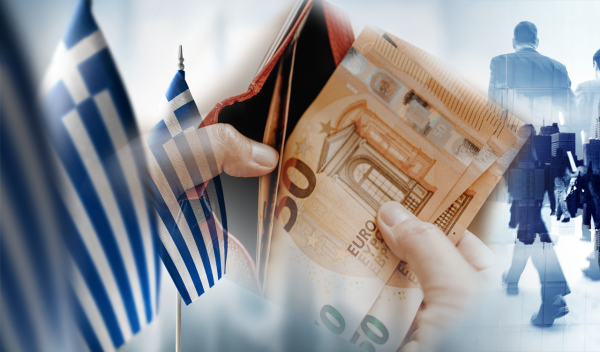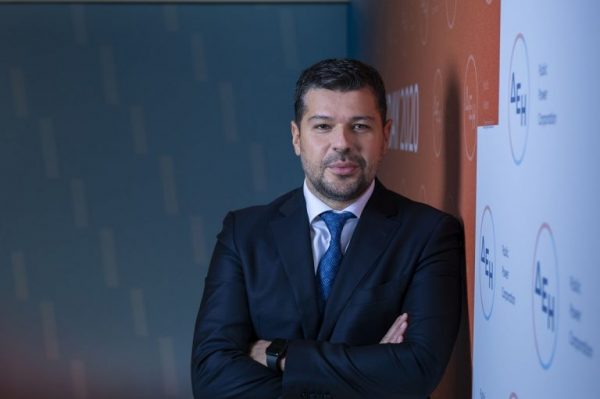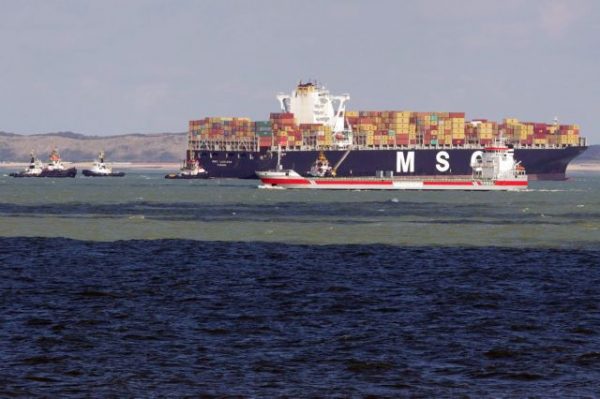
The Greek economy slowed down in the first quarter of 2023, but remained on a steadily rising basis, the National Bank reports in its analysis.
Greek GDP grew by 2.1% on an annual basis and exceeded by a significant margin – for the 8th consecutive quarter – the corresponding average of the euro zone (+1.0% on an annual basis in the 1st quarter of 2023).
The economy is projected to maintain strong growth despite serious challenges
According to the bank’s analysts, the slowdown in GDP growth from the 4.8% recorded in the fourth quarter of 2022 mainly reflects:
- the elimination of very favorable base effects that boosted activity in 2022, after the full lifting of Covid-related restrictions;
- the negative impact of 2.0 percentage points per annum in the 1st quarter of 2023 from the reversal of the one-off positive effects related to rapid inventory accumulation (including other statistical adjustments) experienced in 2022. This strongly positive impact in 2022 was mainly due to the preemptive build-up of energy raw material stocks, amid high uncertainty, as well as the effort of businesses to replenish non-energy stocks that had shrunk due to high demand. This development is considered temporary and is not expected to be repeated in the coming quarters.
- the tighter monetary and fiscal policies.
Private consumption
The report notes that private consumption rose a solid 2.9% year-on-year (+1.4% quarter-on-quarter, SA), driven by supportive labor market conditions and falling energy prices.
Specifically, real worker earnings rose 1.3% y-o-y in Q1 2023, after falling 1.8% y-o-y for all of 2022, reflecting an estimated rebound in nominal wages (nearly 5%) while the annual increase in employment was 1.4%.
Household non-wage income, as well as corporate profits, also moved higher as gross operating surplus and gross income across the economy
increased by 9.3% YoY in Q1 2023.
Reflecting strong confidence levels and attractive yields, gross fixed capital formation (GFCF) increased by 8.2% y-o-y in Q1 2023 to 14.5% of GDP (y-o-y), driven by rising construction activity ( +19.6% y/y), led by housing investment (+48.4% y/y).
Exports
Net exports surprised positively with a contribution of +0.9 p.m. to annual GDP growth in Q1 2023 – marking a sharp reversal from the average negative effect of 2.8 percentage points in 2022. It is noted that in addition to service exports increasing by 6.2% year-on-year – driven by strong tourism performance – goods exports increased by 10.6% at constant prices, exceeding even the most optimistic expectations, and reached an all-time high of €10 billion, at constant prices (20.6% as a percentage of GDP).
This performance highlights the strength of the export activity of Greek companies in a less favorable environment, compared to the previous two years, as well as the increasing diversification of the export markets for Greek products and the more general composition of Greek exports.
At the same time, total imports slowed to +5.6% y/y (at constant prices) in Q1 2023, with their negative impact on annual GDP change limited to 2.4 percentage points from 4.6 percentage points in 2022 .The above trends in exports and imports are compatible with our forecast for a significant reduction in the current account deficit in 2023.
These developments are consistent with the NBG’s forecast for a rapid improvement in the current account deficit this year.
On the road to recovery
The NBG also reports that – with the information available from monthly surveys and seasonal indicators data – economic activity shows signs of strengthening in the second and third quarters.
Specifically:
• The Economic Sentiment Index (ESI) rose to 108.4 in April-May from 106.8 in Q1 2023, widening its positive gap against the euro area average.
• The services and retail confidence components of the ESI remain near all-time highs in Q2 2023 (average index levels of 35.1 and 21.0 respectively in April-May compared to 16.6 and 21 .3 in Q1 2023).
• Inflationary pressures subsided, with CPI growth slowing to 2.9% y-o-y in April-May from 5.9% in Q1 2023, due to further declines in energy prices over the same period (-18.7% in annual basis), easing the pressure on real disposable income.
• In addition, the significant fall in international food commodity prices in Q1 and Q2 2023 – to the lowest level in almost 2 years – is expected to be gradually passed on to consumers with a lag of around 2 quarters.
• Employment growth rose to 1.6% year-on-year in April from 1.4% year-on-year in the first quarter of 2023, according to labor force survey data, while ERGANI data showed that net employee hiring flows rose to an all-time high.
• Resilient demand and reduced production costs will support healthy, albeit slower, growth in corporate earnings.
• International arrivals at Athens International Airport in April-May 2023 exceeded by 7% the corresponding performance in the same period of the record year 2019, while the 1st quarter of 2023 was broadly in line with the 1st quarter of 2019.
• A further improvement in the external sector’s contribution to economic activity is expected in Q2: as rising tourism activity combines with resilient export orders and increasingly supportive underlying results, import growth slows after last year’s surge.
Where does the bar come in for 2023
The above trends bode well for GDP growth accelerating to 2.5% year-on-year in the second quarter of 2023, translating to GDP growth of nearly 3.0% for FY2023.
Risks
According to the National Bank, the main downside risks for the baseline scenario are related to the weakening of the activity of the euro area, due to the delayed effect of the continued tightening of monetary policy to control inflation, and the possible reduction of the economic climate from a repetition of the tensions in the energy market as a result of geopolitical factors.
Latest News

Greece Defines Continental Shelf Limits and Maritime Zones in Landmark EU Document
The Maritime Spatial Planning (MSP) framework represents a comprehensive approach to spatial planning and is crucial for the successful development of a blue and circular economy

EU Praises Greece’s RRF Progress as Revised Recovery Plan Nears Completion
Athens is preparing to submit its revised “Greece 2.0” Recovery and Resilience Plan after Easter, with a slight delay from the initial timeline but with the European Commission’s approval.

Greek €200M 10Y Bond to be Issued on April 16
The 3.875% fixed-interest-rate bond matures on March 12, 2029, and will be issued in dematerialized form. According to PDMA, the goal of the re-issuance is to meet investor demand and to enhance liquidity in the secondary bond market.

German Ambassador to Greece Talks Ukraine, Rise of Far Right & Tariffs at Delphi Economic Forum X
Commenting on the political developments in his country, the German Ambassador stressed that it was clear the rapid formation of a new government was imperative, as the expectations across Europe showed.

Athens to Return Confiscated License Plates Ahead of Easter Holiday
Cases involving court orders will also be excluded from this measure.

Servicers: How More Properties Could Enter the Greek Market
Buying or renting a home is out of reach for many in Greece. Servicers propose faster processes and incentives to boost property supply and ease the housing crisis.

Greek Easter 2025: Price Hikes on Lamb, Eggs & Sweets
According to the Greek Consumers’ Institute, hosting an Easter dinner for eight now costs approximately €361.95 — an increase of €11 compared to 2024.

FM Gerapetritis Calls for Unified EU Response to Global Crises at EU Council
"Europe is navigating through unprecedented crises — wars, humanitarian disasters, climate emergencies," he stated.

Holy Week Store Hours in Greece
Retail stores across Greece are now operating on extended holiday hours for Holy Week, following their Sunday opening on April 13. The move aims to accommodate consumers ahead of Easter, but merchants remain cautious amid sluggish market activity.

Green Getaway Ideas for Easter 2025 in Greece
Celebrate Easter 2025 in Greece the sustainable way with eco-farms, car-free islands, and family-friendly getaways rooted in nature and tradition.









































 Αριθμός Πιστοποίησης
Αριθμός Πιστοποίησης